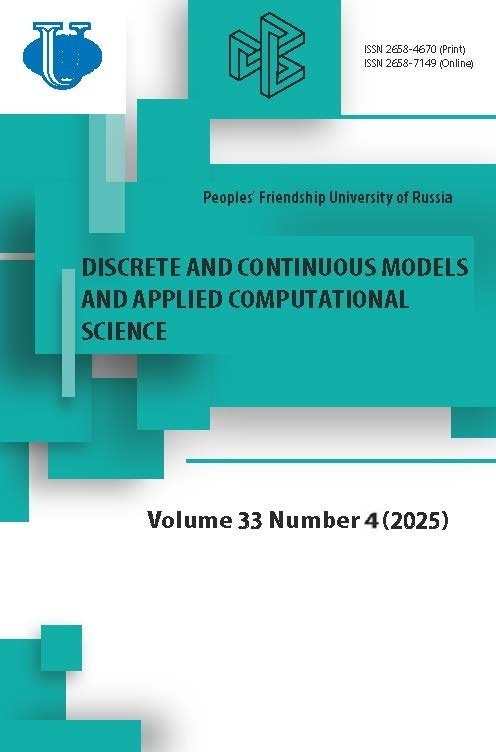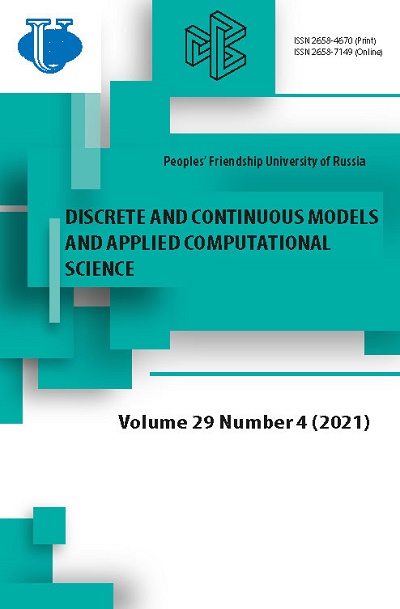Vol 29, No 4 (2021)
- Year: 2021
- Articles: 5
- URL: https://journals.rudn.ru/miph/issue/view/1485
- DOI: https://doi.org/10.22363/2658-4670-2021-29-4
Full Issue
In Memory of Vladimir Gerdt
Abstract
Center for Computational Methods in Applied Mathematics of RUDN, Professor V.P. Gerdt, whose passing was a great loss to the scientific center and the computer algebra community. The article provides biographical information about V.P. Gerdt, talks about his contribution to the development of computer algebra in Russia and the world. At the end there are the author’s personal memories of V.P. Gerdt.
 306-336
306-336


Calculation of integrals in MathPartner
Abstract
We present the possibilities provided by the MathPartner service of calculating definite and indefinite integrals. MathPartner contains software implementation of the Risch algorithm and provides users with the ability to compute antiderivatives for elementary functions. Certain integrals, including improper integrals, can be calculated using numerical algorithms. In this case, every user has the ability to indicate the required accuracy with which he needs to know the numerical value of the integral. We highlight special functions allowing us to calculate complete elliptic integrals. These include functions for calculating the arithmetic-geometric mean and the geometric-harmonic mean, which allow us to calculate the complete elliptic integrals of the first kind. The set also includes the modified arithmetic-geometric mean, proposed by Semjon Adlaj, which allows us to calculate the complete elliptic integrals of the second kind as well as the circumference of an ellipse. The Lagutinski algorithm is of particular interest. For given differentiation in the field of bivariate rational functions, one can decide whether there exists a rational integral. The algorithm is based on calculating the Lagutinski determinant. This year we are celebrating 150th anniversary of Mikhail Lagutinski.
 337-346
337-346


Quantum mereology in finite quantum mechanics
Abstract
Any Hilbert space with composite dimension can be factored into a tensor product of smaller Hilbert spaces. This allows us to decompose a quantum system into subsystems. We propose a model based on finite quantum mechanics for a constructive study of such decompositions.
 347-360
347-360


Parameterizing qudit states
Abstract
Quantum systems with a finite number of states at all times have been a primary element of many physical models in nuclear and elementary particle physics, as well as in condensed matter physics. Today, however, due to a practical demand in the area of developing quantum technologies, a whole set of novel tasks for improving our understanding of the structure of finite-dimensional quantum systems has appeared. In the present article we will concentrate on one aspect of such studies related to the problem of explicit parameterization of state space of an -level quantum system. More precisely, we will discuss the problem of a practical description of the unitary -invariant counterpart of the -level state space , i.e., the unitary orbit space . It will be demonstrated that the combination of well-known methods of the polynomial invariant theory and convex geometry provides useful parameterization for the elements of . To illustrate the general situation, a detailed description of for low-level systems: qubit (), qutrit (), quatrit () - will be given.
 361-386
361-386


On involutive division on monoids
Abstract
We consider an arbitrary monoid , on which an involutive division is introduced, and the set of all its finite subsets Set. Division is considered as a mapping , whose image is the set of divisors of in . The properties of division and involutive division are defined axiomatically. Involutive division was introduced in accordance with the definition of involutive monomial division, introduced by V.P. Gerdt and Yu.A. Blinkov. New notation is proposed that provides brief but explicit allowance for the dependence of division on the Set element. The theory of involutive completion (closures) of sets is presented for arbitrary monoids, necessary and sufficient conditions for completeness (closedness) - for monoids generated by a finite set . The analogy between this theory and the theory of completely continuous operators is emphasized. In the last section, we discuss the possibility of solving the problem of replenishing a given set by successively expanding the original domain and its connection with the axioms used in the definition of division. All results are illustrated with examples of Thomas monomial division.
 387-398
387-398
















